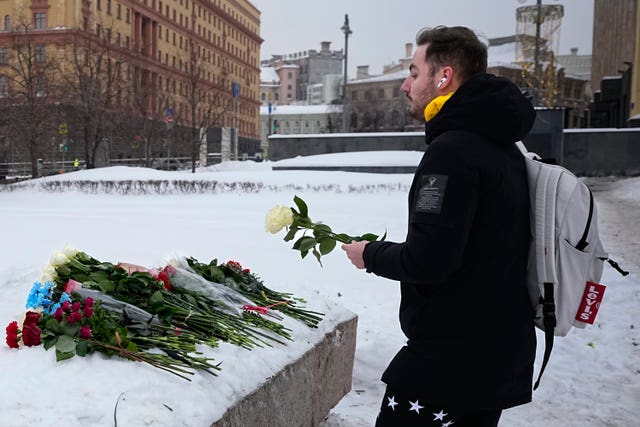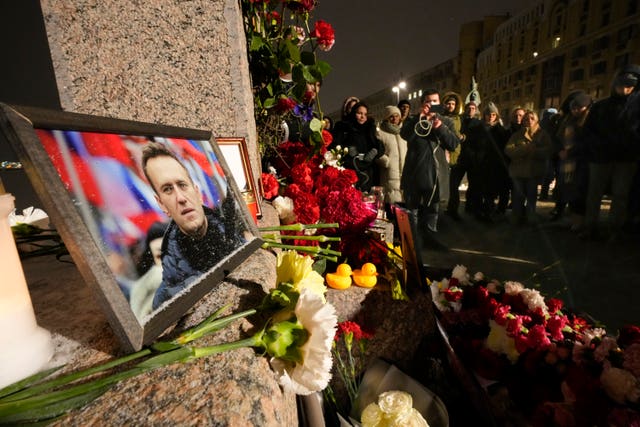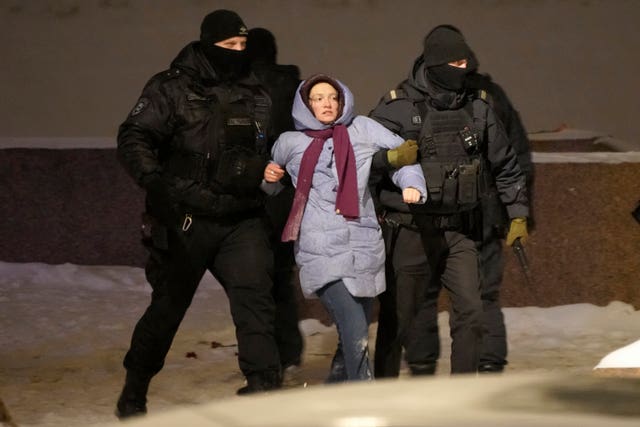Floral tributes to Alexei Navalny, President Vladimir Putin’s fiercest foe who died on Friday in a Russian penal colony, were removed overnight by groups of unidentified people while police watched, videos on Russian social media show.
More than 100 people were detained in eight cities across Russia after they came to lay flowers in memory of Mr Navalny, according to OVD-Info, a group that monitors political repression in Russia.
On Saturday, police blocked access to a memorial in the Siberian city of Novosibirsk and detained several people there as well as in another Siberian city, Surgut, OVD-Info said.
Video shared on social media from Novosibirsk showed people sticking red flowers upright in the snow under the watchful eye of police who blocked access to the memorial with ticker tape.

In Moscow, flowers were removed overnight from a memorial near the headquarters of Russia’s Federal Security Service by a large group while police looked on, a video showed.
But by morning more flowers had appeared.
The news of Mr Navalny’s death comes less than a month before an election that will give Mr Putin another six years in power.
It shows “that the sentence in Russia now for opposition is not merely imprisonment, but death”, said Nigel Gould-Davies, a former British ambassador to Belarus and senior fellow for Russia and Eurasia at the International Institute for Strategic Studies in London.
The circumstances of Mr Navalny’s death are still largely unclear.
Russia’s Federal Penitentiary Service reported that Mr Navalny felt sick after a walk on Friday and lost consciousness at the penal colony in the town of Kharp, in the Yamalo-Nenets region about 1,900 kilometres (1,200 miles) north-east of Moscow.
An ambulance arrived but he could not be revived, and the cause of death is still “being established”, it said.
Mr Navalny had been jailed since January 2021, when he returned to Moscow to face certain arrest after recuperating in Germany from nerve agent poisoning he blamed on the Kremlin.

He was later convicted three times, saying each case was politically motivated, and received a sentence of 19 years for extremism.
After the last verdict, Mr Navalny said he understood he was “serving a life sentence, which is measured by the length of my life or the length of life of this regime”.
Hours after Mr Navalny’s death was reported, his wife, Yulia Navalnaya, made a dramatic appearance at a security conference in Germany where many leaders had gathered.
She said she had considered cancelling, “but then I thought what Alexei would do in my place. And I’m sure he would be here”, adding that she was unsure if she could believe the news from official Russian sources.
“But if this is true, I want Putin and everyone around Putin, Putin’s friends, his government to know that they will bear responsibility for what they did to our country, to my family and to my husband. And this day will come very soon,” Ms Navalnaya said.
US President Joe Biden said Washington does not know exactly what happened, “but there is no doubt that the death of Navalny was a consequence of something Putin and his thugs did”.
Mr Navalny “could have lived safely in exile”, but returned home despite knowing he could be imprisoned or killed “because he believed so deeply in his country, in Russia”.

In Germany, Chancellor Olaf Scholz said Mr Navalny “has probably now paid for this courage with his life”.
Kremlin spokesman Dmitry Peskov said Mr Putin was told of Mr Navalny’s death.
The opposition leader’s spokeswoman, Kira Yarmysh, said on X, formerly Twitter, that the team had no confirmation yet.




Comments: Our rules
We want our comments to be a lively and valuable part of our community - a place where readers can debate and engage with the most important local issues. The ability to comment on our stories is a privilege, not a right, however, and that privilege may be withdrawn if it is abused or misused.
Please report any comments that break our rules.
Read the rules hereLast Updated:
Report this comment Cancel